The child spent his childhood in a neighborhood full of drug abuse, theft, and prostitution. Now, he is an exporter of Vietnamese drones to the world .
The building in an alley on Confucius Street, Thu Duc City (HCMC), has a strong “smell” of mechanical manufacturing. This is the temporary headquarters of Realtime Robotics Inc. (RtR). In front of each employee’s desk are scattered components that make up unmanned aerial vehicles (drones).
The company’s CEO, Dr. Luong Viet Quoc, said that here, one-on-one debates between him and young engineers happen all the time. That is the nature of product R&D. Late last year, RtR was the first company to export 100% “Made in Vietnam” HERA drones to the world.
In a short-sleeved T-shirt, jeans and old sandals, Mr. Quoc looks much younger than his 58 years. The doctor who returned from Silicon Valley (USA) is thinking about unimaginable things, based on Vietnamese intelligence.
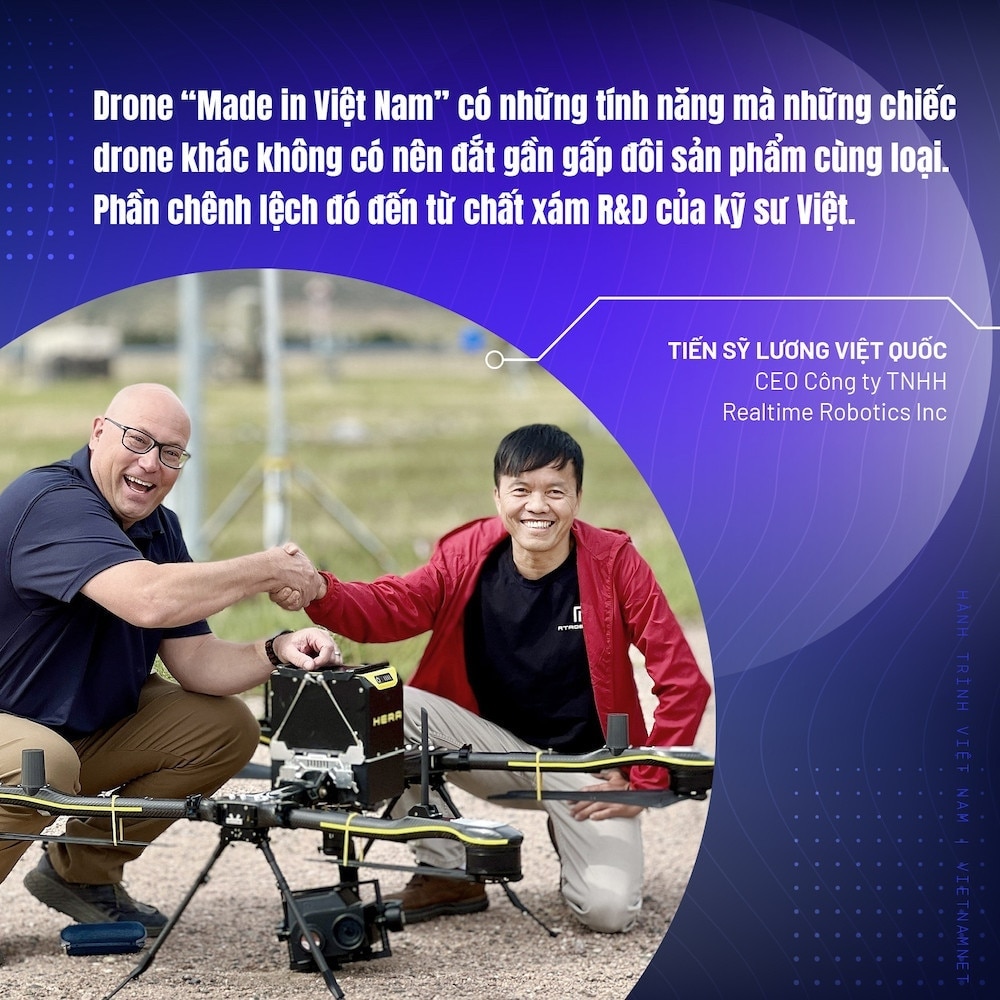

- Realtime Robotics is a company specializing in manufacturing drones. The company's products are exported to developed countries. Even though you have headquarters in the US, why don't you manufacture locally but instead manufacture in Vietnam?
Dr. Luong Viet Quoc : The quality of brainpower is what determines my return to Vietnam to produce drones. Some people also ask me if it is because of cheap labor costs? If it is because of cheap labor costs, I can completely open a company in many other countries. The issue here is the efficiency of brainpower, the talent of Vietnamese engineers who are capable of R&D technology products.
After living and working in Silicon Valley, I realized that the mindset of developed countries is always towards the future. They learn about what the future needs while there are no solutions at present, from there, companies find ways to solve the problems they are facing.
Great inventions that have changed human life, such as: Internet, smartphones, Google, most recently ChatGPT... all originated from the US. You will see, this country has a forward-looking vision, they think about where society will go in 5-10 years, looking far ahead to focus on R&D. That is what I want to do with Vietnamese human resources.
- It's easy to say, but is Vietnam's industry still in a state of "being a latecomer" compared to many countries in the world?
Dr. Luong Viet Quoc : The starting point of Vietnamese industry is very low, that is a fact that must be admitted. But it would be "a waste of time" if we just consider supporting industry as increasing the localization rate. Instead, we need to look further, seek achievements based on existing inventions, to create a springboard.
For example, if an iPhone is sold on the market for $1,000. The cost of the phone is only about $400 at most, of which the assembly cost is $30. The remaining largest value is $600 that Apple pockets, accounting for 60% of the product value.
Suppose, Vietnam is the country that achieves 100% localization of all Apple phone components from screen, chip, memory... then it will take full 400 USD. That is the purpose of localization. But, what we need to aim for is the 600 USD that Apple pockets. That is the achievement from product R&D and creativity.
If in the past, Korea was always behind Japan in TV products, today, Korea's Samsung has defeated Japan's Sharp or Toshiba brands. Because they have made breakthrough improvements and inventions in TV screens. Vietnam should follow this path.
Even neighboring China is the same, they are having products that are world-class competitors, not just being “copied” like before. For example, Chinese DJI drones are leading the world in the segment for filming and photography. Countries like Japan, Korea, and the US cannot compete.
- Is that why HERA drones are sold at high prices on the market but are still sought after by customers?
Dr. Luong Viet Quoc : Yes. HERA is sold for 58,000 USD/unit while similar products are priced at around 30,000 USD/unit, the difference comes from the R&D brainpower of Vietnamese engineers. Drones “Made in Vietnam” have features that other drones do not have, so users are willing to pay a high price to buy them.
The value of a drone lies in the capabilities of the equipment it can carry. Physically, to lift a heavy object, the motors and propellers must be large enough to create enough lift. Drones are no different.
HERA solves the above problem. This is a drone model that fits in the wearer's backpack but can carry up to 15kg of equipment when flying, which is 7 times more than similar products. In terms of space, drone models in the world usually only have enough space to mount 1 payload or 1 camera, but HERA can carry 4 payloads at the same time, each with a 360-degree field of view. Therefore, HERA's mission performance is superior to existing drones.
HERA targets the professional market, used for infrastructure inspection such as wind power, solar power, high-voltage power lines, bridges, etc. From December 2022 to present, the product sales revenue is about 700,000 USD. In addition to supplying the US market, we are also negotiating with buyers in the UK to export HERA to NATO (North Atlantic Treaty Organization).
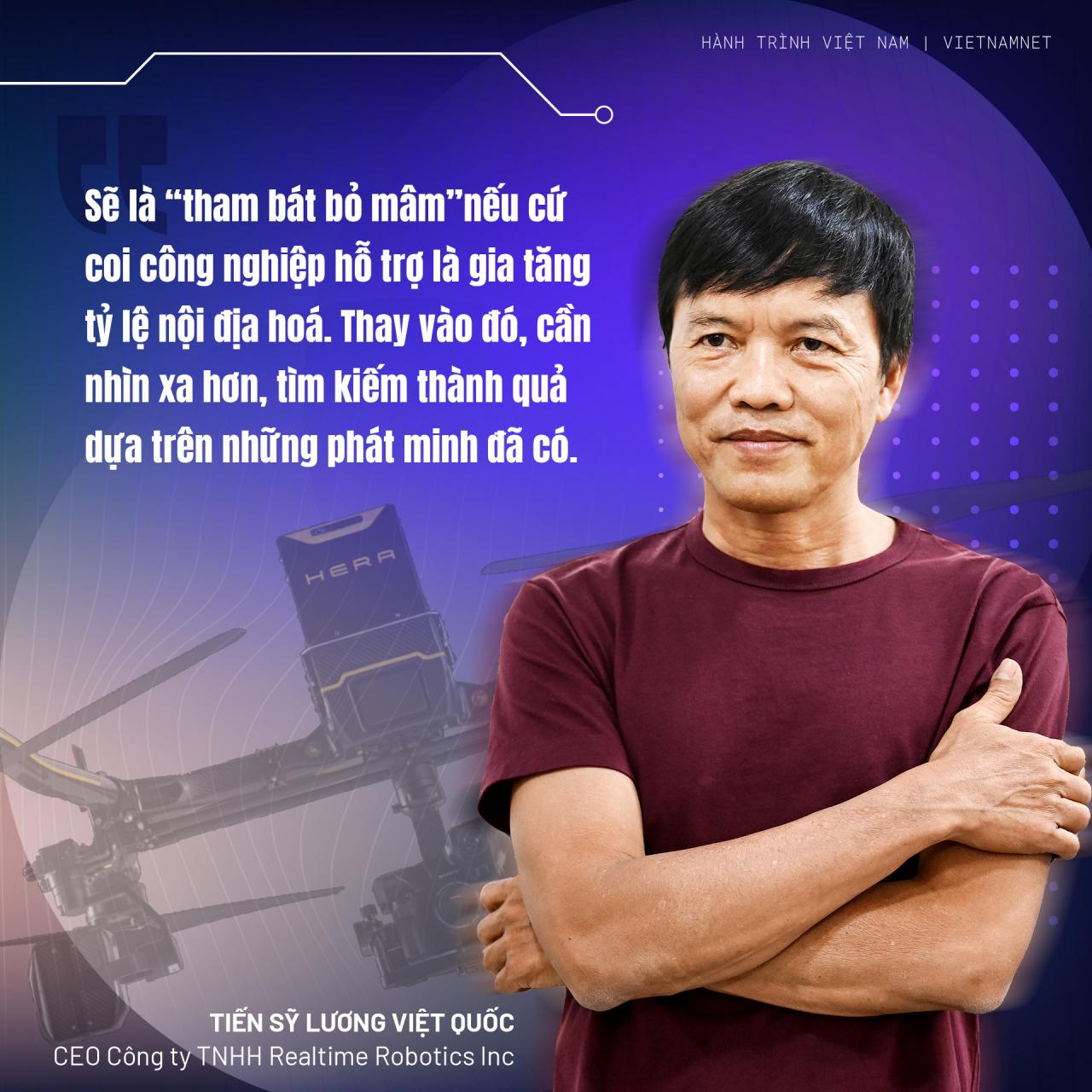

- So, what is the key to Realtime Robotics' success today?
Dr. Luong Viet Quoc : The “merchant” mindset will hinder development. Instead, creativity is what our business always aims for.
For Vietnamese industrial enterprises in general, invent what is in daily life... Like ChatGPT, starting with only about 100 employees, when the product is formed, there will be people willing to invest money.
Up to now, why has the phrase “Made in Vietnam” been rated lower than the phrase “Made in Japan”? We need to look straight at the truth. Because the value of “Made in Japan” is the result of decades of Japanese companies providing excellent quality products to the world such as Sony, Toyota, Honda... Therefore, if we want the phrase “Made in Vietnam” to have value, we need pioneering companies. What other way is there?
Producing world-class products is how businesses contribute to building a national brand. Vietnamese engineers are talented enough to create inventions that compete fairly internationally. If Vietnamese businesses do not do it, who will?
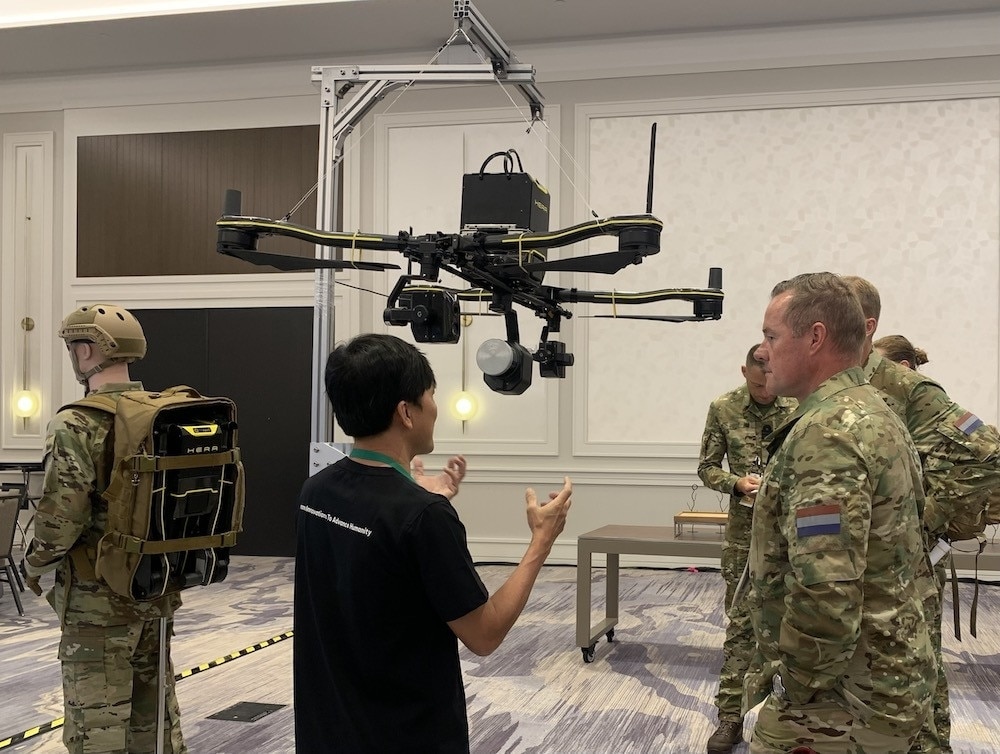
Dr. Quoc introduces Made in Vietnam drones
- Looking back on the journey, do you feel lucky to have achieved your current results?
Dr. Luong Viet Quoc : I have angel investors who invested 4 million USD in the company since I started in 2014. Angels mean they put their faith in what we were doing at that time, it was all or nothing. But I don't think it was "luck", it was more "cause and effect". You have to do something to convince others to believe and spend that much money to invest? I have proven myself worthy and capable of inventing a world-class product.
Speaking of support, unfortunately, Vietnam does not have a mechanism or policy to support businesses with such risks. Because when you pour money into R&D, there is no guarantee of results. The success rate is probably less than 10% when investing in invention. We do not have a mechanism for the public sector to dare to accept pouring money into a business, and the result of the invention may be zero. Who will be responsible then?
- If in the US, how would the government solve the above problem?
Dr. Luong Viet Quoc : They have a fund called America's Seed Fund, "seed" is seed, this can be understood as an incubation fund. This fund is sponsored by the US National Science Foundation, specializing in funding small and medium-sized enterprises with breakthrough inventions in all fields.
The government knows that businesses have great ideas but they don’t have the money to make them happen. At this point, the government finances the company and doesn’t take any ownership or percentage of ownership. So the government is willing to fund and accept losing money. A large percentage of businesses will fail, but only a small percentage will succeed, they will become technology unicorns, pay taxes back to the government, and the national science will develop. That is the ultimate purpose of public funding.
I know, Vietnam does not have such a risky public investment mechanism, but we can take a shortcut. Imagine this for startups that need money.
The first option is for the State to call on businesses to submit their inventions. Then, a professional review board is established to select projects to receive funding. In this option, the issue depends on the impartiality of the review board. It is not excluded that the members of the board know the businesses, not to mention the situation of “collusion” in the review.
The second option is to let the market decide. If a company has an invention that is accepted by a reputable fund like the US, the State can use that as a basis to decide how much % of the project value to re-fund.
For example, if the project is internationally recognized, the State will sponsor about 20-30% of the amount. Thus, we do not need to spend time finding talented businesses. If the patent continues to be successfully commercialized and the product is consumed in the market, the proportion of funding for the business can increase. Or, the State supports the company with land to build a factory...
Let the market be the judge. If there is such a mechanism, many businesses will accept to invest in innovation.
- With what we have, what are Realtime Robotics' plans for the future?
Dr. Luong Viet Quoc : It is important for a technology company to constantly update because the product life cycle is short and changes very quickly. If we continue to rely on the success of HERA, we will fall behind. This year, we will continue to file 4 patents in the field of drones, and will have products that can be applied and supported in agriculture.
Realtime Robotics will be one of the most innovative and trusted drone companies in the world. Innovative in product development and transparent in data management.
When we complete the construction of the factory in the Ho Chi Minh City High-Tech Park, the production capacity can increase 10-20 times, the profit is about 10 million USD/year, growing annually. That is the goal.
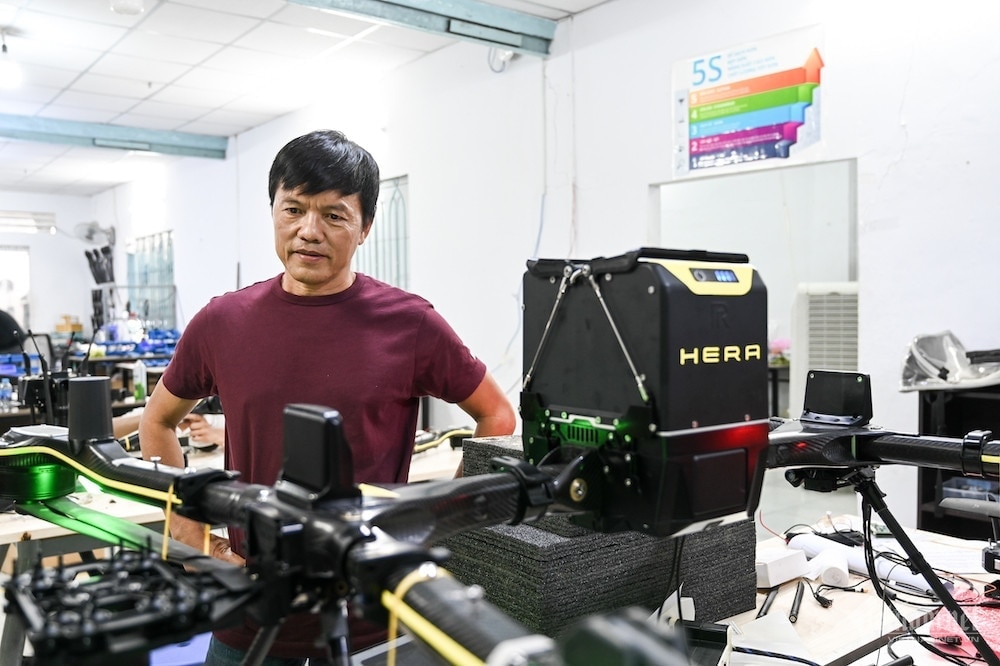

- Looking back a little bit on the past, I heard that Luong Viet Quoc had an unforgettable childhood in a gangland right in the center of Ho Chi Minh City. Is that true?
Dr. Luong Viet Quoc : Yes, those were unforgettable years. My family had 9 siblings, living and working together on a floor area of about 10 square meters. The house was located on a branch of the Nhieu Loc - Thi Nghe canal, a "dead" stream both literally and figuratively. That was where I lived.
Much has changed now, but before, it was a poor neighborhood at the bottom of society with theft, drugs, and prostitution. Many families made a living by stealing. Life forced them to do so.
At 12, I picked up trash to make a living on that black water. At 13, I sold lemons and chili peppers to make money. At 15, I dug worms from the bottom of the canal to sell to aquarium shops. There were nights when I soaked in the water for 5-6 hours to dig worms, and selling the worms was enough to buy 1kg of rice.
My life changed when I realized the value of education. I finished grade 12 but failed to get into university, so I chose to study at the Ho Chi Minh City Finance High School. After that, I continued my studies at university and spent 2 years studying English.
From someone who knew nothing about foreign languages, I achieved a TOFEL score of 6th out of 150 candidates in the 1994 exam. In 2002, I received a Fulbright postgraduate scholarship (USA). I won a doctoral scholarship in the US in the following years. After what I have experienced, I find this life to be truly wonderful. The unimaginable has become reality for me. Even in my dreams, I did not think of it.
In 2002, I spent my first night in an unfurnished apartment in Ithaca, New York. I wrapped myself in a blanket and slept on the floor, half a world away from my family. But I was happy at that moment, because the next day I was going to continue my studies at one of the top schools in the country.
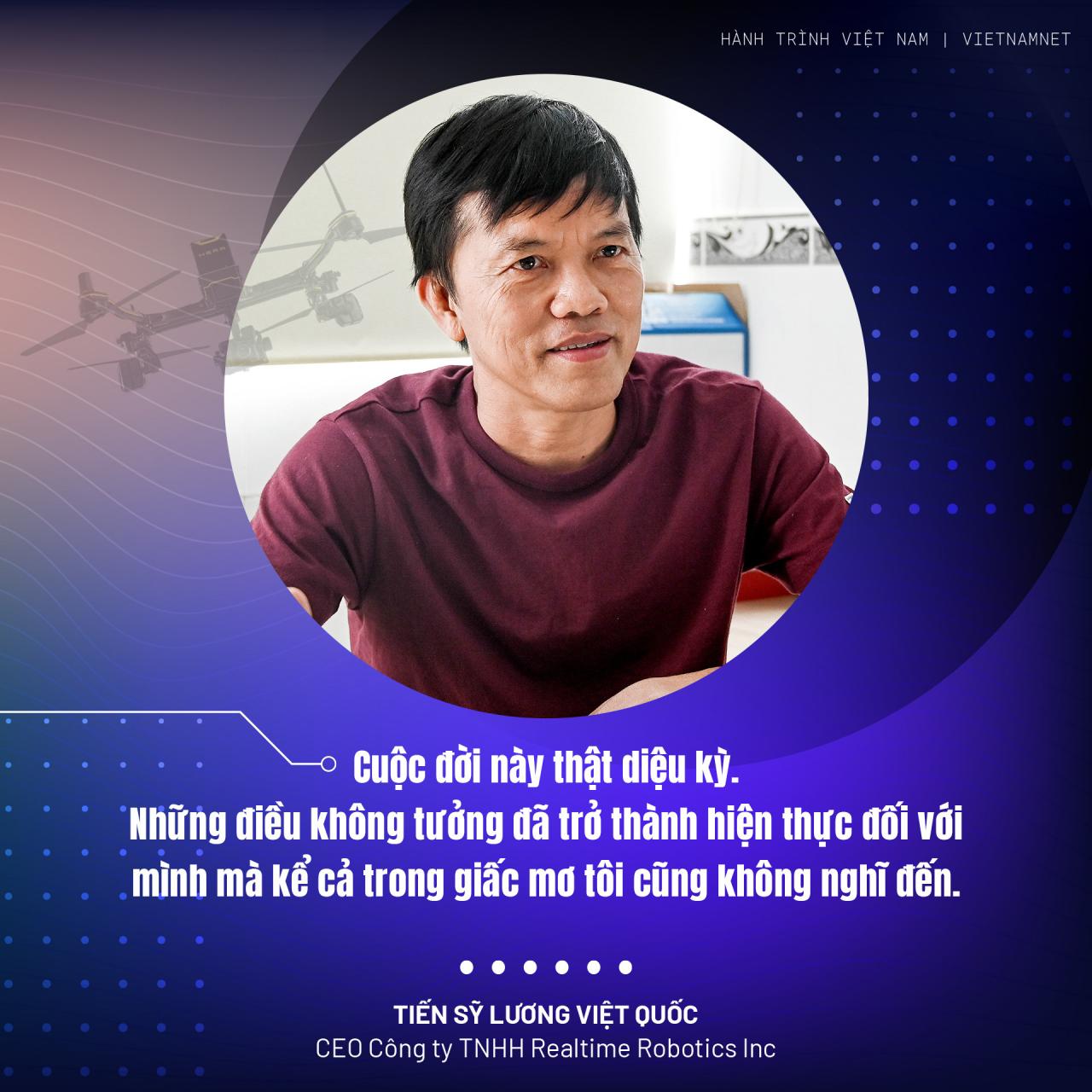
- From a kid in a "black" neighborhood to the CEO of a technology company, initially reaching out to the world, how do you feel when your success story is often mentioned and many people consider you an idol?
Dr. Luong Viet Quoc : Every heroic story told always creates inspiration to encourage and motivate people to rise up in adversity. However, my story is just a tip of the iceberg.
Imagine, my image and a few other successful individuals are at the tip of the iceberg, that is, the one that everyone sees. Because we are above the surface of the water. But the rest of the iceberg, the part that is submerged under the water, is much larger. The percentage of successful people like us is very low in society, you could say one in a thousand children. We are the exception, not the rule.
So when someone talks about us as heroes, there are so many children out there living in a different world. This story is the same in every country, not just Vietnam.
Until now, my childhood friends on the “black” canal are still stuck in that world. They cannot escape. They work for free, have a little money, drink, get drunk, fight and the cycle of life continues. In my family, besides me, there is only one older sister who is a teacher, the rest of my siblings all have unfinished education.
Therefore, if we focus on telling heroic stories, we will forget that for every heroic story that appears, there will be thousands, tens of thousands of other children still trapped in a world of poverty. We must never forget these children, society must solve their problems, that is what we need to aim for.
A country with so many heroic examples means that the hidden part of the iceberg is still very large. So, when talking about me or other successful examples, if possible, please do not call us “heroes”.
- Thank you for the interview!
Performed by: Tran Chung
Photo: Nguyen Hue
Design: Minh Hao
Vietnamnet.vn


















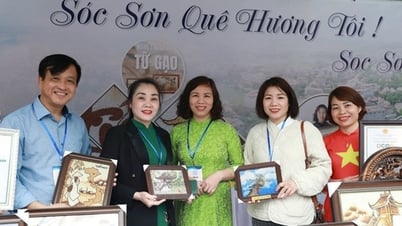




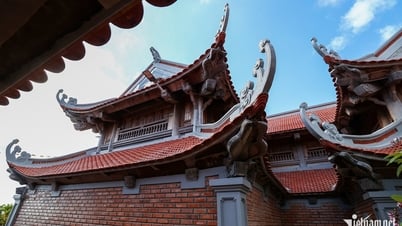


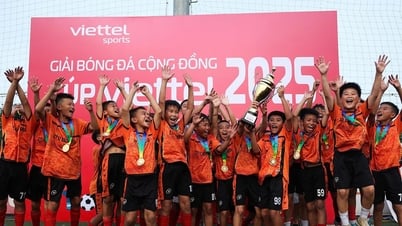


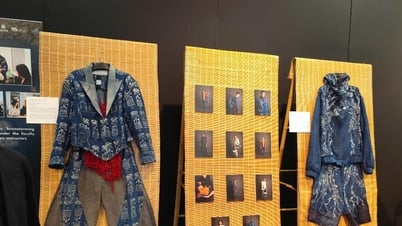


















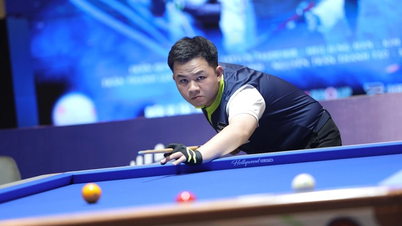








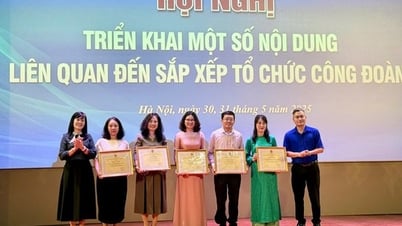







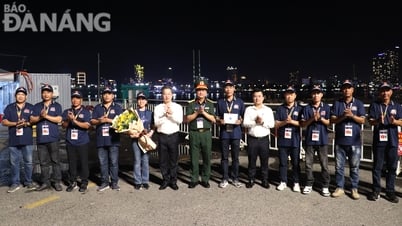

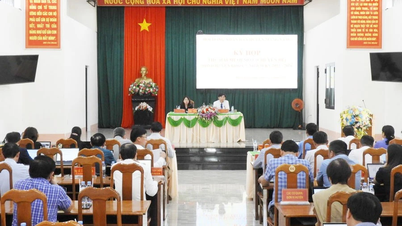















Comment (0)